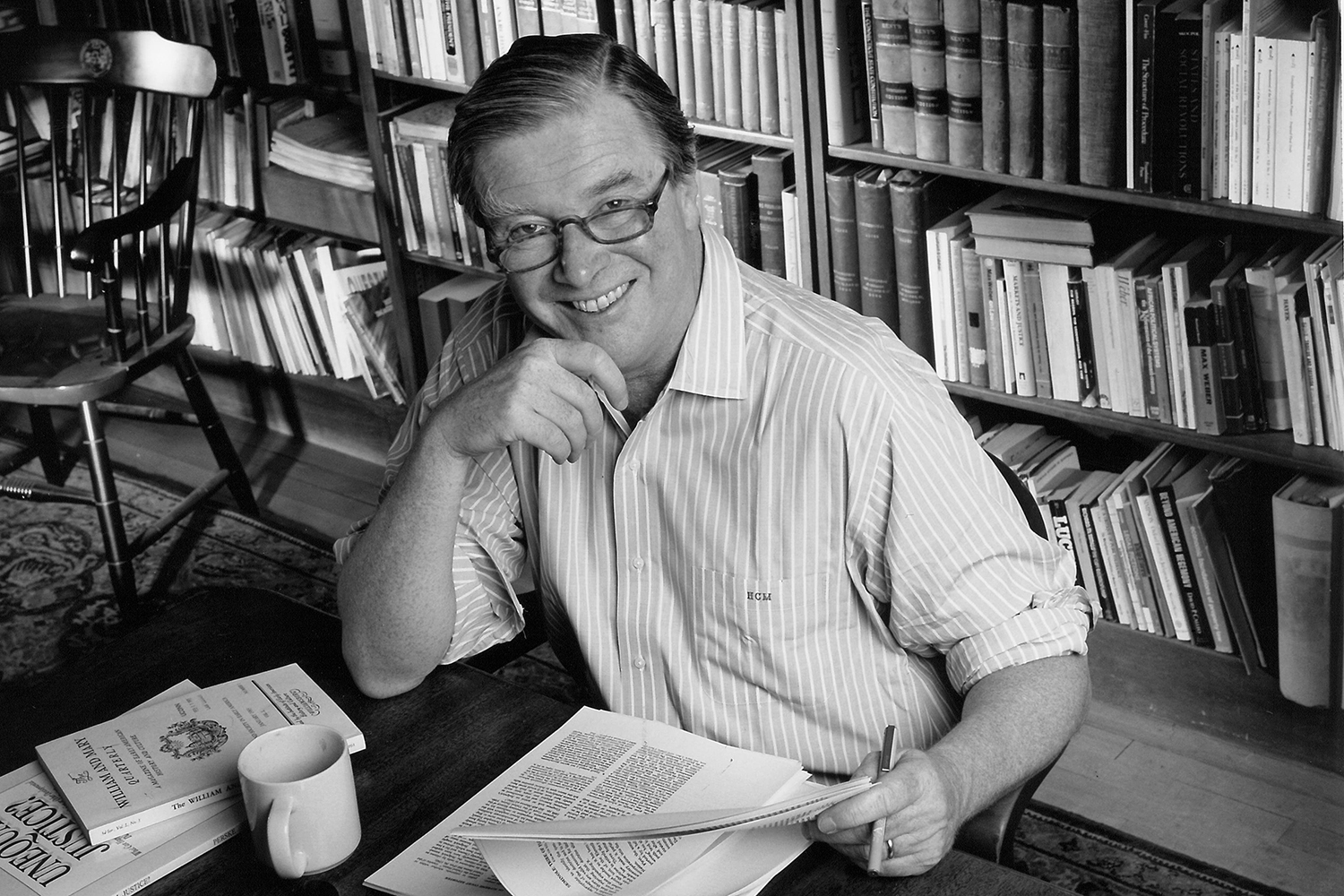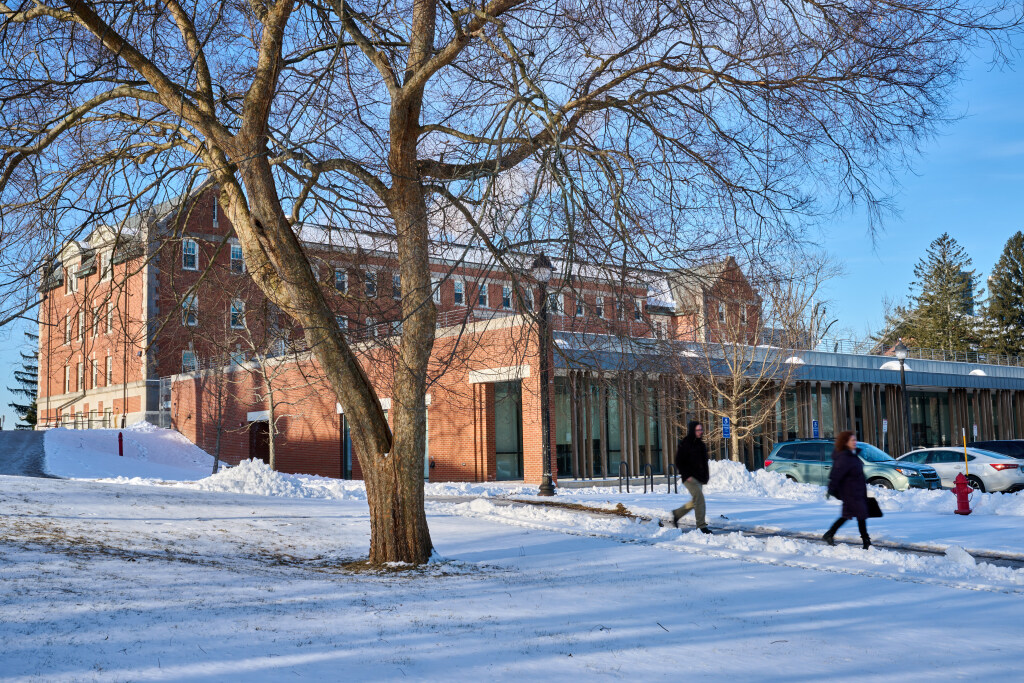Hugh C. Macgill, the witty and charismatic dean of the University of Connecticut School of Law from 1990 to 2000, died Feb 13, 2020. He was 79.
Known for his charm, humor and a masterful gift for language, Macgill also possessed political and strategic skills that served the law school on many occasions. As dean, he negotiated the construction of a new law library, elevated faculty scholarship and raised the law school’s national and international standing. As an influential faculty member, he worked tirelessly behind the scenes to help keep the law school moving forward.
“We have lost one of the greatest leaders this school ever had, and our broader community has lost one of the most profound contributors to civil life of the past half century,” Dean Timothy Fisher said. “Dean Macgill’s passionate love for the law school and its mission, and his incisive and elegant teaching inspired generations of future lawyers and public leaders.”
Macgill was born in 1940 on a farm in Maryland, halfway between Baltimore and Washington, son of a banker who moved the family north, first to Westchester, New York, and then to Princeton, New Jersey. After attending Hotchkiss School in Salisbury, Connecticut, and starting college at Yale, he left part-way through to join the Army and study Mandarin at the Army Language School. It was a decision he described in a 2010 interview with historians Kent Newmyer and Bruce M. Stave as “dramatic enough, but more or less nuts.”
After serving in the Army Security Agency in Taiwan for three years, intercepting and translating mainland Chinese military communications, Macgill returned to Yale. He graduated in 1965 with a BA in Russian. He attended law school at the University of Virginia and graduated in 1968.
While in law school, he began to demonstrate his deep commitment to the law as a force for social justice, helping found the first legal aid office in Charlottesville. He worked one summer during law school enforcing federal desegregation guidelines in southwest Georgia. “I don’t think I had much impact on Georgia, but it was a powerful experience for me,” he later said. He spent the next summer working for a Wall Street law firm, where he was “bored beyond tears.”
His inclinations thus clarified, Macgill graduated from law school and joined the Reginald Heber Smith Community Lawyer Fellowship Program. He asked to be sent to Baltimore, where he worked on tenants’ rights issues and learned “how to get things done in the absence of any power at all.” He then took his fellowship to Minnesota, where he worked with the Saint Paul Urban Coalition. Afterward, with a grant from the Bush Foundation, he went to Yale Law School, studied and worked as a graduate fellow. He arrived at UConn Law as a visiting assistant professor in 1970 and joined the faculty in 1971.
In 1976, Macgill married Nancy Rankin, who survives him along with their two children, Charles and Alexandra. He loved his family even more than he loved the law school, which is saying a great deal, said Newmyer, a close friend of many years. When Nancy emerged as a distinguished photographer, Hugh graciously divided their universe: Nancy does the images, he once confided to Newmyer, I do the words.
Although he was proud of his Southern roots, Macgill was also deeply attached to New England and the community in Addison, Maine, where he and his family escaped every summer. He enjoyed nothing more than driving his battered pickup truck around town and chatting with his Down East neighbors, whom he came to admire greatly, Newmyer said.
After joining the UConn Law faculty, Macgill taught legal history and constitutional law, and worked with Dean Phillip I. Blumberg to mastermind the law school’s move to the campus of the former Hartford Seminary in 1984. He then served as associate dean for academic affairs under Dean George Schatzki.
When Schatzki stepped down in 1990, Macgill interviewed with the faculty for the job. “I told my colleagues that I was not as smart as Phillip and not as nice as George,” he said. He got the job, the first time a faculty member was chosen from within the law school for the post, but with one condition that he imposed on himself.
“Most of our graduates take the Connecticut bar examination. I decided I should take it, too. I would not accept the job unless I passed.” He did.
That solidarity with students was a hallmark. Karen DeMeola, a 1996 graduate and now the law school’s assistant dean for finance, administration and enrollment, recalled how Macgill immediately set her class at ease on the first day of orientation in 1993. “He said, ‘Look to your right. Look to your left. You’re all going to make it,’” she recalled. “That one statement took away all my anxiety about failing.”
Construction of the Thomas J. Meskill Law Library was Macgill’s signature achievement as dean, although he credited Schatzki with getting the project on the table. Macgill was relentless in his campaign to convince legislators and university officials that the library facilities in William F. Starr Hall were inadequate. Asked in 2010 what his vision of the new library had been, he replied with typical lucidity, “Space to put the books in, damn it!”
In fact, his vision was much greater than that, and the elegant building would fulfill his conception of an intellectual campus center that would raise the law school’s national profile. In 1996, on the law school’s 75th anniversary, Macgill presided at the library’s dedication with U.S. Supreme Court Justice Stephen Breyer as a guest and featured speaker.
Macgill also moved the law school ahead in practical learning, establishing a Tax Clinic, partnerships for transactional and child advocacy clinics, and a clinical fellowship. His tenure produced the Insurance Law Center, the Connecticut Insurance Law Journal, and the university’s first two LLM degree programs.
Under his leadership, the law school also raised its international stature with conferences in Europe and Asia. And Macgill expanded the breadth and depth of faculty expertise by hiring scholars with international experience and credentials, including Willajeanne McLean, Steven Wilf and Angel Oquendo.
Believing that community service was part of a dean’s calling, Macgill served in myriad professional and civic organizations, including as chairman of the Connecticut Humanities Council, the State Ethics Commission and the Connecticut Urban Legal Initiative, and president of the Connecticut Bar Foundation, the Connecticut Historical Society and Neighborhood Legal Services in Hartford. He also served on the board of Miss Porter’s School and on the board of the Lewis Walpole Research Library in Farmington, Connecticut.
Macgill stepped down from the dean’s office in 2000, but continued to teach until 2014.
“Ten years is enough,” he said later. “You’ve done all you can do, and you’re getting stale, know it or not. It’s probably not good for the helmsman to stay longer, and it is dreadful for the ship to have the same hands on the tiller for longer than that.”
Hugh Macgill once wrote about his greatest teacher, “we all have our models. … We stumble along in emulation until, with luck, we learn to be ourselves instead. But if we are very lucky indeed, the model still sustains us and leads us on.”
Those words apply equally to Macgill himself, Fisher said. “We were blessed to have him as our model, our leader and our guide.”
A memorial, to be announced at a later time, will be held in the spring on the law school campus.
In lieu of flowers, the family suggests contributions to the Downeast Coastal Conservancy, P.O. Box 760, Machias, ME 04654, or to the Hugh C. Macgill Endowed Scholarship at UConn Law, payable to The UConn Foundation, 2390 Alumni Dr., Unit 3206, Storrs, CT 06269.


